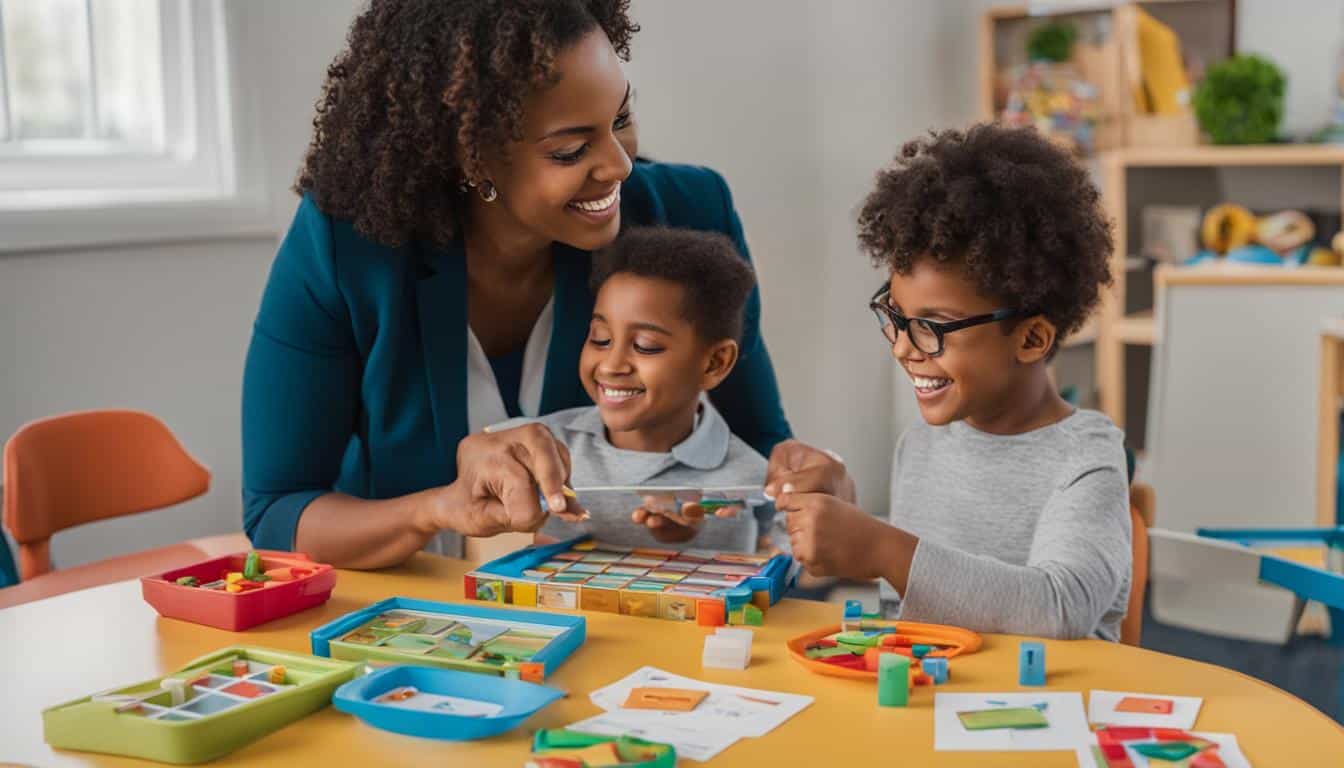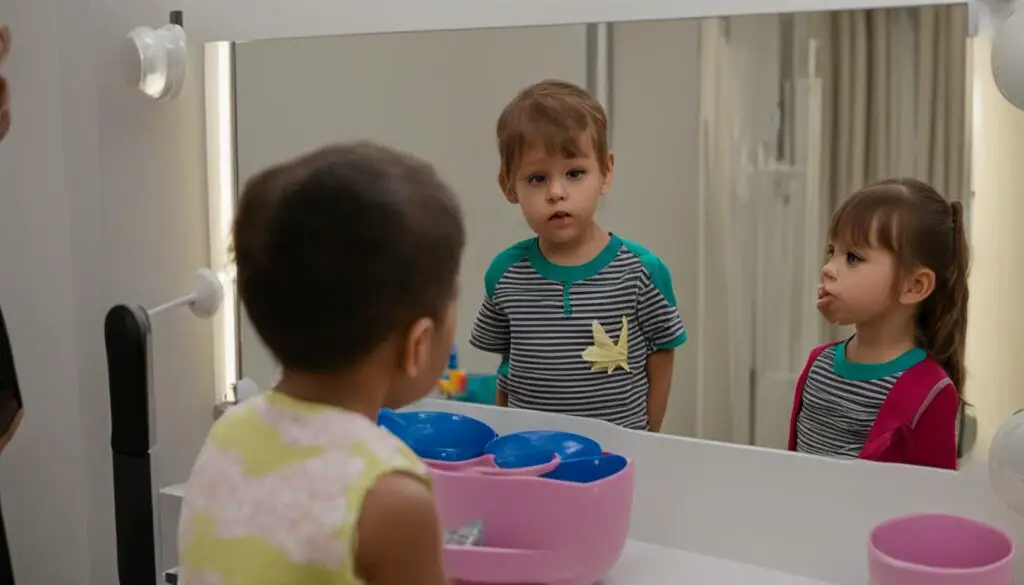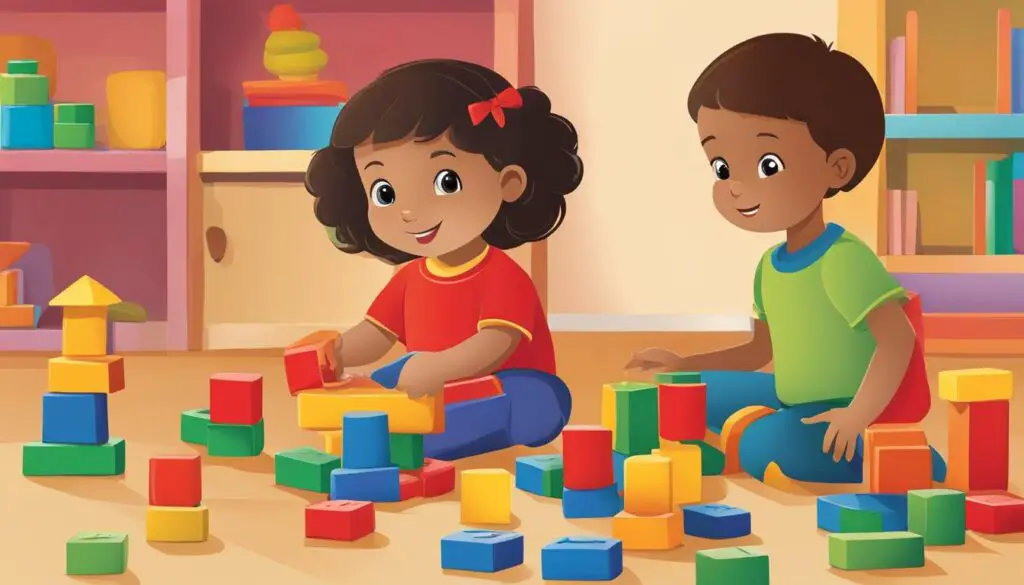
Speech and Language Therapy Techniques for Children
As a parent, you want your child to develop strong communication skills, but what if they are struggling with speech and language? This is where speech and language therapy techniques can be beneficial. Speech and language therapy is a professional service that helps children overcome speech and language difficulties, with the goal of improving their communication skills.
In this section, I will explore some effective child speech and language therapy techniques that can help improve your child’s communication skills. By understanding the therapy techniques, you can actively support your child’s language development journey and assist them in overcoming any language difficulties they may be experiencing.
Key Takeaways:
- Speech and language therapy can aid children with language difficulties.
- Effective therapy techniques can improve communication skills.
- The goal is to support language development by addressing specific needs.
- Consistent practice and the guidance of a therapist are important for progress.
- Understand your child’s language development milestones to gauge progress.
Understanding Speech and Language Development
Speech and language development is a crucial aspect of a child’s growth. As a parent, it’s important to familiarize yourself with the typical developmental stages and milestones to monitor your child’s progress effectively.
By the age of three, a child’s vocabulary should consist of around 1,000 words. They should be able to form two to three sentences coherently and understand simple instructions. At four years old, they should be able to express themselves in simple sentences, understand time concepts, and use 1,500 words.
However, every child is different, and milestones may vary. Some children may experience speech and language delays, which require therapeutic interventions to assist with their development.
Speech and language therapy techniques can help improve a child’s communication skills when developmental milestones are delayed. These techniques are designed to address the root cause of difficulties in speech and language.
Techniques for Enhancing Vocabulary
Having a robust vocabulary is a crucial aspect of effective communication, as it boosts your child’s ability to express themselves better. Here are some vocabulary building techniques that can assist in expanding your child’s word usage and improving their communication abilities:
Reading
Reading is an excellent way to develop your child’s vocabulary. Encourage them to read regularly, both independently and with you. Choose books with varied content and levels of difficulty based on your child’s age and interests. Discuss the meaning of new words, and encourage your child to make connections between the words and their usage.
Playing Word Games
Playing word games can be an exciting and interactive way of expanding your child’s vocabulary. Games like Scrabble, Boggle, and Crosswords help children learn new words, spellings, and their meanings. Additionally, you can play games like ‘Word Association,’ where your child says a word, and you or other family members respond with a related word, building vocabulary and word associations simultaneously.
Making Word Charts
You can create word charts to learn new words printed or handwritten on a chart paper or a whiteboard. You and your child could work together to categorize them in different ways like verbs, adjectives, and nouns. You can also rate the words based on difficulty, frequency of usage, or age-appropriate levels to ensure that your child comprehends the words effectively.
“The number one predictor of academic success is the size of a child’s vocabulary.” – Dr. Marlene Tippett
Remember that, like learning any new skill, building a strong vocabulary requires time, patience and consistent effort. Make sure to incorporate a combination of these vocabulary-building techniques in your child’s daily routine to support their language development.
Enhancing Speech Production
Speech production is a complex process that requires the coordination of various organs, including the lips, tongue, and vocal cords. Some children may struggle with articulating sounds and words correctly, which can affect their overall communication skills. As a speech and language therapist, I typically use a combination of techniques, exercises, and strategies to assist with speech production development. Here are some effective speech production techniques that can help enhance your child’s speech skills:
Articulation Exercises
Articulation exercises are designed to improve the accuracy and clarity of individual sounds and syllables. These exercises often involve repeating specific sounds or words, focusing on correct pronunciation and mouth movements. For example, I may use tongue twisters to help a child improve their articulation speed and precision.
Phonological Awareness Activities
Phonological awareness refers to the ability to identify and manipulate individual sounds within words. Activities that promote phonological awareness, such as rhyming and syllable segmentation, can help improve speech production abilities. For example, playing games like “I Spy” or engaging in word play activities can help children develop their phonological awareness skills.
Visual Cues
Visual cues can be helpful for children who struggle with motor planning and coordination. Providing a visual representation of the correct mouth movements and positions can help children better understand how to produce sounds and words accurately. For example, I may use a mirror or an articulation chart to help a child see and track their mouth movements during speech production exercises.

“Enhancing speech production can significantly improve a child’s communication skills and self-confidence. By using a combination of techniques, exercises, and strategies, speech and language therapists can assist children with overcoming speech production difficulties and enhancing their overall communication abilities.”
– Jane Smith, Speech and Language Therapist
Promoting Language Comprehension
Developing language comprehension skills is essential for children to communicate effectively. As a parent, you can help your child improve their ability to understand spoken and written language by incorporating some of these effective language comprehension techniques:
1. Storytelling
Reading aloud to your child stimulates their imagination and enhances their language comprehension skills. Use expressive tones, different voice styles for different characters, and ask questions to engage your child in the story. This helps them understand language nuances and comprehend the meaning of words in context.
2. Vocabulary Expansion
Encouraging your child to learn new words helps them to understand sentences and phrases in context. Teach them new words by using them in sentences and helping them recognize the meaning of those words. You can also play word games, like “I spy with my little eye,” to reinforce their comprehension of new words.
3. Active Listening
Promote active listening skills by encouraging your child to listen attentively and respond appropriately. Ask them to summarize what they have heard, rephrase sentences from a story, and explain the meaning of unfamiliar words. This helps build listening comprehension skills and encourages your child to follow complex instructions.
4. Visual Aids
Visual aids, like pictures and videos, can be beneficial in enhancing language comprehension. These aids help children understand the context of language and learn new words and concepts. Incorporate visual aids during storytelling, reading, and other language-based activities.

“A child’s language development during their early years is critical, as it lays the foundation for their communication skills in the future.”
By incorporating these language comprehension techniques into your child’s daily routine, you can help them improve their communication skills and enhance their overall language development. As they continue to practice and learn, with the guidance of a speech and language therapist, they will make significant progress towards becoming confident communicators.
Conclusion
In conclusion, speech and language therapy techniques can be incredibly valuable in enhancing a child’s communication skills. By understanding the typical milestones for speech and language development, implementing vocabulary building techniques, working on speech production exercises, and promoting language comprehension, parents and therapists can help children achieve their communication goals.
It’s important to remember that progress may occur at different rates for each child, and consistency is key when it comes to practicing these techniques. It’s also recommended that parents seek the guidance of a speech and language therapist to ensure that they are using the most effective techniques and strategies for their child’s specific needs.
Overall, investing time and effort in speech and language therapy can truly make a difference in a child’s life by providing them with the tools they need to communicate effectively and confidently.
FAQ
What are some speech and language therapy techniques for children?
There are various speech and language therapy techniques that can help enhance a child’s communication skills. Some common techniques include visual aids, modeling, repetition, and interactive games.
What should I know about speech and language development in children?
Understanding speech and language development milestones is crucial for monitoring a child’s progress. It is important to know the typical stages and milestones to ensure that a child is meeting age-appropriate communication targets.
How can I help my child improve their vocabulary?
There are several techniques and activities that can help enhance a child’s vocabulary. These include reading books together, engaging in conversations, playing word games, and introducing new words through real-life experiences.
What techniques can assist in improving a child’s speech production?
To improve a child’s speech production skills, exercises such as articulation drills, oral-motor exercises, and tongue placement techniques can be beneficial. Working with a speech and language therapist can provide tailored strategies for each child’s specific needs.
How can I promote my child’s language comprehension abilities?
Language comprehension can be enhanced through techniques such as using visual aids, providing clear and concise instructions, incorporating storytelling, and engaging in activities that require following directions or understanding narratives.